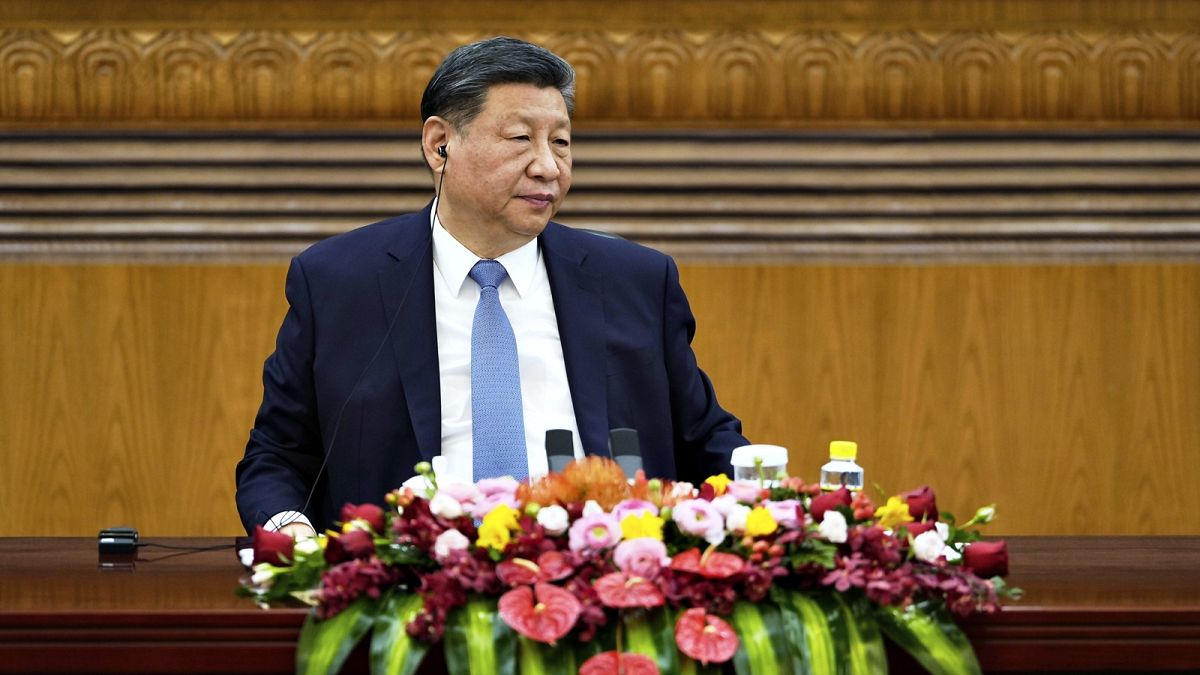China has hit back at the intervention of Ursula von der Leyen at the G7 summit, during which she excoriated Beijing for perpetuating what she called a “pattern of dominance, dependency and blackmail” vis-à-vis its trading partners.
“We express strong dissatisfaction and firm opposition to those baseless and biased remarks that reflect double standards,” Guo Jiakun, the spokesperson of the Chinese Foreign Affairs Ministry, said on Wednesday at a press briefing.
The exchange of accusations upends the perceived momentum in EU-China relations triggered by US President Donald Trump’s sweeping tariffs, which have targeted allies and adversaries alike and spread panic across the business world.
The export-oriented bloc has been working the phones to secure alternative markets that can help cushion the impact of Trump’s disruptive policies. With its 1.4 billion citizens, China is, for some, the most obvious choice to fill the gap.
Sensing an opening, Beijing has made several overtures to curry favour with Brussels, including by lifting the controversial sanctions on members of the European Parliament and re-engaging in talks to solve the dispute over China-made electric vehicles.
Last month, Chinese President Xi Jinping hailed the 50th anniversary of EU-China relations as an opportunity to “open up a brighter future” in diplomacy.
“Both sides should uphold multilateralism, safeguard fairness and justice (and) oppose unilateralism and bullying,” Xi said, in apparent reference to Trump’s duties.
Von der Leyen replied: “We remain committed to deepening our partnership with China. A balanced relationship, built on fairness and reciprocity, is in our common interest.”
But during the G7 summit in Canada, the president of the European Commission adopted a surprisingly hawkish tone to denounce China’s state-led economy and the “distortions” caused by its industrial overcapacity and heavy-handed use of subsidies.
She also declared that the source of “the biggest collective problem” in the global trading system was China’s accession to the World Trade Organization (WTO) in 2001.
Beijing’s entry into the WTO has been controversial, as it opened international markets to the mass production of low-cost exports. The admission is linked to the so-called “China shock” and a decline in manufacturing jobs in both Europe and the US.
At the G7, von der Leyen warned a “new China shock” was currently underway.
“China still defines itself as a developing country. This cannot be. China has largely shown that it unwillingness to live within the constraints of the rules-based international system,” von der Leyen said.
“While others opened their market, China focused (on) undercutting intellectual property protections, massive subsidies with the aim to dominate global manufacturing and supply chains,” she went on. “This is not market competition – it is distortion with intent.”
In reaction, the Chinese Foreign Ministry sought to turn the tables and accused the EU of lavishing its own companies with “massive subsidies” and pursuing a policy of “European preference”. The EU has similarly accused Beijing of a buy-China clause.
“The so-called overcapacity story is nothing but a pretext used by relevant countries to go protectionist, simply because they fear for their own competitiveness and market shares. The problem is not ‘overcapacity’, but ‘over-anxiety’,” Guo said.
“The EU is working to boost its growth and competitiveness. That requires giving up double standards, being more open and embracing cooperation.”
Rare earths dispute
At the core of von der Leyen’s intervention was Beijing’s recent decision to restrict the sales of seven rare earth materials, which the Commission had described as “alarming”.
China holds a quasi-monopolistic position over rare earths, the 17 metallic elements that are essential for building cutting-edge technologies. The country commands roughly 60% of the world’s supply and 90% of the processing and refining capacity.
“China is using this quasi-monopoly not only as a bargaining chip, but also weaponising it to undermine competitors in key industries,” she said.
Although the restrictions have eased in recent days, von der Leyen cautioned “the threat remains” and called on the G7 to close ranks in “pressuring” China.
Her remarks were made in the presence of Trump, whose administration is bent on curbing China’s rise as a high-tech military superpower. Officials in Brussels hope China can be a shared point of interest to strengthen the fragile transatlantic alliance.
“Donald is right – there is a serious problem,” she said, appealing to the American.
The Chinese Foreign Ministry dismissed these objections, insisting the country was acting in a “responsible” way and would speed up “the review and approval” of export licences, which foreign clients need to acquire the sought-after materials.
“The so-called ‘market distortions’ and ‘overcapacity’ accusations are absolutely false. The G7 use them as an excuse for their trade protectionist practices, and to essentially contain and suppress China’s industrial progress, and politicise and weaponise economic and trade issues,” the spokesperson said.
Despite the heated rhetoric, the ministry extended its hand to deepen ties with the EU, signalling the country is still hopeful for a diplomatic reset.
“China stands ready to increase communication and coordination with the EU, properly handle trade differences, and achieve win-win and shared prosperity,” Guo said.
“That said, we firmly oppose any attempt to hurt China’s right to development or even assert one’s own interests at China’s expense.”
An EU-China summit is scheduled to take place in late July.

